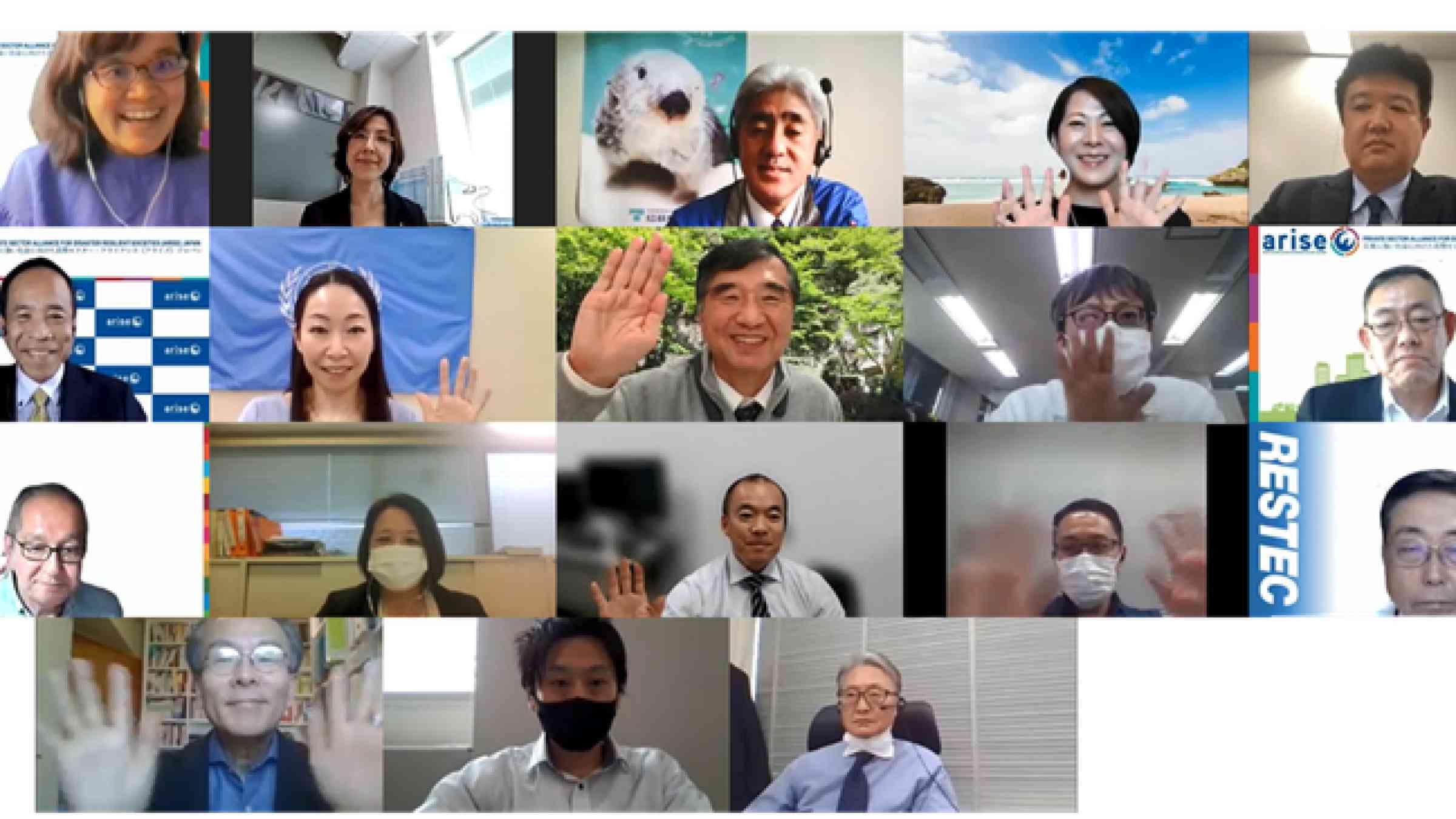ARISE Japan Public Symposium 2022 showcases practical approaches to building the resilience of travel destination communities via the strengthening of SMEs

ARISE Japan successfully hosted its seventh annual public symposium, titled “Increasing resilience to disasters by strengthening SMEs as a community: learnings from the travel and tourism sector,” on 14 March 2022. The event highlighted SME actions coming out of a pilot programme by the Tourism Crisis Management and Business Continuity Improvement Work Group, run jointly by the Japan Chamber of Commerce and Industry (JCCI) and the Japan Tourism and Travel Association (JTTA). The programme draws on existing human resources from chambers of commerce and destination management organizations to strengthen SME resilience. The event was co-organized by ARISE Japan and UNDRR Office in Japan, and supported by JCCI, JTTA, Japan Bosai Platform and Global Compact Network Japan.
The event kicked off with welcome remarks. “Lessons learned in improving business continuity of travel and tourism SMEs in Japan will surely be replicable in other parts of the world,” noted Mr. Satoshi Hijikata, ARISE Board (Kokusai Kogyo Co., Ltd.) during his welcome as organizer. Ms. Yuki Matsuoka, UNDRR Office in Japan explained the broader context, as well as the significance of the event’s date, by saying “the Sendai Framework clearly mentions that the expertise and skills provided by the private sector are essential to its implementation; such strong focus on the private sector was propelled by the global sharing of Japanese businesses’ good practices around the Great East Japan Earthquake, which occurred 11 years ago” in her welcome as co-organizer.
Mr. Mr. Yuzuru Yashiro, JTTA, then gave an overview of the pilot programme and described its latest phase where human resources from chambers of commerce, travel associations, and destination management organizations were first trained to provide BCP guidance, then guided through their first actual workshops for SMEs in their community. “The two-day workshops were actually conducted with about two weeks in between, so that businesses could take back and consider their BCP internally, and bring back the results for feedback on the second day,” he explained. JCCI and JTTA will scale the trainings and workshops to cover all parts of Japan, and model BCPs and materials developed in the process would be made public, so that efforts to improve the resilience of travel and tourism SMEs could continue beyond the programme. Moderator Mr. Masato Takamatsu, ARISE Japan Lead (Tourism Resilience Japan) added “tourism businesses often cannot re-start operations unless they are able to deliver service at a certain level of quality, and thus, financial issues tend to show up starkly in tourism BCPs, as well as the need to provide continued employment” and introduced the two good practices to follow.
Mr. Kanau Okude, Toba Aquarium presented the first good practice on ensuring continuity as the chief tourist attraction in Toba City, Mie Prefecture. A coastal facility attracting over 600,000 non-local visitors throughout the year, Toba Aquarium was well prepared for fires, earthquakes, and tsunamis; Mr. Okude described the process of formulating a business continuity plan on top of such existing preparedness steps. He said that the BCP formulation process forced him to squarely face the likelihood of having to close the aquarium, depending on the level of damage. “Unlike manufacturing, if there are no visitors, our income becomes zero immediately” he said (see report for more details of this good practice).
A second good practice example was then delivered by the moderator Mr. Takamatsu on behalf of Hotel Ambia Shofukaku, a long-standing, award-winning local leader in DRR in Yaizu City. Shofukaku has concluded an emergency agreement (saigai kyotei) with Yaizu City, Shizuoka Prefecture, promising to provide shelter, bathing facilities, and food to local evacuees in the event of a disaster. “Shofukaku’s operational policy states that they will remain closed for business until they are able to deliver a certain standard of service. At the same time, the policy notes that they will take care of evacuees, including local residents and stranded employees, during such closure” noted Mr. Takamatsu (see report for more details of this good practice).
The presentations were followed by a discussion portion. Ms. Nanae Takanami, Toba City discussed her impressions of the pilot project, as head of Toba City’s tourism administration as well as recipient of trainers training. “When city personnel assist tourism businesses in planning their business resilience, we are in fact protecting the community, improving the area’s brand and recognition, and enhancing the value of the community overall; such a role for city personnel makes perfect sense in tourism destination locations” she said. Ms. Yuka Onaga, Thunderbird Co., Ltd. commented on how difficult it was to promote business continuity planning among tourism businesses, particularly using currently available government guidelines which content-wise had many ‘ill fits’ for the industry when it came down to details, and looked forward to the scaling phase of this pilot programme. “A nation-wide initiative to improve resilience and business continuity in the tourism sector, such as this travel and tourism BCP pilot programme, will help make Japan a chosen destination by global travelers” Ms. Onaga said. Ms. Matsuoka, UNDRR Office in Japan noted the collaboration between LG and businesses, such as is evident between Toba Museum’s Mr. Okude and discussant Ms. Takanami of Toba City, was an example of how governments can practically support the private sector into adopting better business continuity practices (see report for further discussion details).
“Ensuring that visitors feel safe will be a key concern of travel and tourism in the post-Covid era, and I hope this contribution from Japan will further assist the tourism sector in Asia and the world towards that aim” noted Mr. Takamatsu, ARISE Japan Lead in his closing remarks.
ARISE Japan is working on its three-year action plan focusing on resilience in the tourism sector as a Sendai Framework Voluntary Commitment.
Relevant links:
Event report:
https://www.preventionweb.net/media/79579/download
ARISE Japan’s SFVC:
https://sendaicommitments.undrr.org/commitments/20190305_008